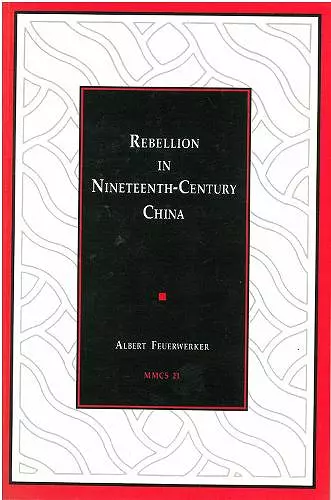Rebellion in Nineteenth-Century China
Format:Paperback
Publisher:The University of Michigan Press
Published:1st Jan '75
Currently unavailable, and unfortunately no date known when it will be back

Popular rebellion in China was usually the undertaking of the mostly illiterate lower classes, sometimes inspired or assisted by a handful of disaffected intellectuals. The written record of these events is, on the other hand, overwhelmingly the product of literate men of power and wealth who suppressed these challenges to their authority and status. Added to this imbalance in the written record, an inverse problem has emerged in twentieth-century characterizations by historians in the People’s Republic of China. Communist historiography classifies these events as peasant uprisings (nung-min chi’i-i, literally “righteous uprisings of the peasantry”) in an attempt to construct a new, popular, and progressive past. Charting a course between these two modes, Rebellion in Nineteenth-Century China discusses domestic disorder with more nuance, considering the sources of social dissidence, the varieties of domestic rebellion, the responses of the state and society to such uprisings, and the consequences of rebellion and suppression for a dynasty already shaken by foreign invasion. Emphasizing the number and variety of these uprisings, Feuerwerker places them within a hierarchy of dissidence that distinguishes between 1) spontaneous, usually small-scale and local antiofficial or antilandlord actions, 2) interlineage and communal “feuds”, 3) the religion and secular “underworld”, 4) banditry, 5) rebellion, and 6) revolution. By distinguishing their contexts and causes, Feuerwerker describes and analyzes as one broad social phenomenon a remarkable number and variety of unsuccessful challenges to the Manchu regime.
ISBN: 9780892640218
Dimensions: unknown
Weight: unknown
112 pages